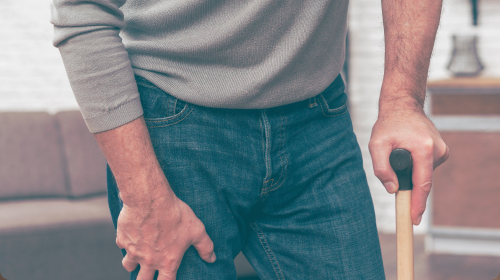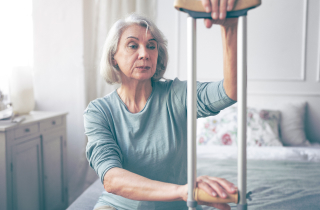Grasping the Impact of Hip Fractures in Seniors and the Vital Role of Assisted Care
A hip fracture in seniors is a severe and frequently life-changing occurrence, especially for individuals who live on their own or with limited support. For numerous elderly individuals, a hip fracture often results in a notable reduction in mobility and a diminished quality of life. At Angel Care, we recognize the essential role that assisted care provides in the rehabilitation journey of seniors recovering from hip fractures. In this article, we delve into the signs, symptoms, treatment options, and the crucial importance of assisted care for elderly individuals dealing with a fractured hip.
Identifying the Indicators of a Hip Fracture in Seniors
Hip fractures in seniors often arise from falls or minor injuries, but can also be caused by osteoporosis, a condition that gradually weakens bones. Identifying the symptoms of a hip fracture in elderly individuals is essential for securing timely medical care. Typical symptoms include:
- Severe Hip or Groin Pain: The most apparent and immediate symptom is sharp pain in the hip or groin, which worsens with movement.
- Inability to Bear Weight: A senior with a fractured hip, such as on the left side, may find it impossible to stand or walk on the affected leg.
- Leg Shortening or Rotation: The affected leg may often appear shorter or rotated outward (externally) in comparison to the other leg.
- Swelling and Bruising: Noticeable swelling or bruising around the hip region may also be a sign of a fracture.
- Difficulty Moving the Leg: Even minor movements, such as rotating or gently lifting the leg, can result in severe pain.

The Consequences of Hip Fractures on Seniors
A hip fracture in elderly individuals, especially women who are more susceptible to osteoporosis, can significantly affect their health and independence. For an elderly woman with a broken femur or an elderly man with a hip fracture, the injury often results in extended hospital stays, greater reliance on others, and a heightened risk of complications like infections, blood clots, and pneumonia.
Additionally, the psychological impact can be just as crippling. The abrupt loss of mobility and independence may lead to depression and a lowered sense of self-esteem, making the recovery process even more challenging.
Treatment for Hip Fractures in Seniors
Treatment for a hip fracture in the elderly typically involves surgery to repair the break. The type of surgery depends on the fracture’s location and severity. Options include:
- Hip Pinning (Internal Fixation): This surgical method uses screws or metal plates to stabilize the fractured bones during the healing process.
- Partial or Total Hip Replacement: In more severe cases, the damaged portion of the hip joint is replaced with an artificial implant.
The recovery process following hip surgery is vital and generally includes physical therapy to regain mobility and strengthen the surrounding muscles. However, the path to recovery can be lengthy and difficult, especially for seniors with pre-existing health issues.
The Importance of Assisted Care in the Recovery Process
Assisted care plays a crucial role in the recovery of elderly individuals following a hip fracture. At Angel Care, we offer comprehensive support to help seniors restore their independence and enhance their quality of life after such a major injury. Our services include:
- Personalized Care Plans: We customize our care plans to address the specific needs of each individual, ensuring they receive the right level of support and rehabilitation.
- Mobility Assistance: Our caregivers are skilled in providing mobility support, assisting seniors with tasks like walking, transferring from bed to chair, and carrying out exercises recommended by physical therapists.
- Pain Management: We help manage pain by ensuring adherence to medication schedules and providing non-pharmacological relief methods, such as heat therapy and gentle massage.
- Emotional Support: Recovering from a hip fracture can be emotionally difficult. Our caregivers offer companionship and encouragement, helping to alleviate feelings of isolation and depression.
- Safety Enhancements: We evaluate the home environment and introduce safety measures to minimize the risk of falls and prevent further injuries.
Conclusion
A hip fracture in seniors is a critical condition that demands prompt attention and thorough care. The signs of a broken hip in elderly individuals should never be overlooked, as early intervention is essential for effective treatment and recovery. At home care agency Angel Care, we are dedicated to delivering top-quality assisted care to support seniors through the recovery process and help them reclaim their independence.
If your elderly mother, father, or another loved one has experienced a hip fracture, don’t hesitate to reach out to us. Our caring team is ready to provide the necessary support and care to ensure a safe and smooth recovery. Let Angel Care Inc. be your trusted partner in safeguarding the health and well-being of your loved ones.

The Ultimate Brain Game Apps for Seniors: Sharpen Your Mind, Boost Your Memory Let’s face it, getting older in the hustle and bustle of New York isn’t just about navigating crowded sidewalks—keeping your mind sharp is just as crucial. As we age, it’s more important than ever to stay mentally fit, and that’s where brain game apps come into play. These apps are like a gym for your brain, offering a fun and convenient way to keep your memory sharp and delay cognitive decline. Whether you’re looking for free brain games on your iPhone or apps designed specifically for Alzheimer’s, there’s something out there for every senior’s needs. Why Brain Game Apps Matter for Seniors Brain game apps are more than just time-killers—they’re tools designed to give your cognitive skills a serious workout. These apps challenge your memory, problem-solving abilities, focus, and reasoning, helping you stay mentally sharp. Here’s how they can make a difference: Boost Memory: Many memory apps for seniors include exercises that improve recall, which becomes more critical as we age. Enhance Focus: Brain training apps often feature activities that require concentration, helping you stay sharp and alert. Delay Cognitive Decline: Specialized Alzheimer’s and dementia game apps target areas of the brain affected by these conditions, potentially slowing their progression. Have Fun: These apps aren’t just good for your brain—they’re also enjoyable, offering a sense of achievement and satisfaction. Top Brain Game Apps for Seniors Here’s the lowdown on some of the best brain game apps for seniors, covering everything from free options to those designed for memory enhancement and cognitive health. Lumosity One of the big names in brain training, Lumosity offers a mix of games that challenge memory, attention, and problem-solving. The app personalizes your training regimen based on your performance, making it a great choice for ongoing mental development. Available On: iPhone, Android Cost: Free with in-app purchases Peak With over 40 games crafted by neuroscientists, Peak is all about improving your cognitive skills. The app gives you detailed insights into your progress, making it easy to track how far you’ve come. It’s perfect for seniors who want comprehensive brain training. Available On: iPhone, Android Cost: Free with in-app purchases Elevate Elevate focuses on skills like reading, writing, and math, offering personalized training programs to help you improve in specific areas. It’s an excellent tool for keeping your mind sharp. Available On: iPhone, Android Cost: Free with in-app purchases CogniFit Recommended by healthcare pros, CogniFit offers a variety of dementia games specifically designed to boost memory, attention, and reasoning skills. It’s a top pick for seniors looking to delay cognitive decline. Available On: iPhone, Android Cost: Free with in-app purchases Moshi Moshi is all about simple, engaging puzzles and matching games that improve memory. It’s ideal for seniors who want something fun without a huge time commitment. Available On: iPhone Cost: Free with in-app purchases Free Memory Apps for Seniors Not every great brain game app comes with a price tag. Here are a couple of solid options that won’t cost you a dime: Memory Match A classic card-pairing game that’s straightforward but effective for exercising your memory. Perfect for seniors who prefer a simple, no-frills option. Available On: iPhone Cost: Free Sudoku This timeless puzzle game is all about enhancing problem-solving skills and memory. With varying difficulty levels, it’s suitable for everyone, whether you’re a beginner or a Sudoku master. Available On: iPhone, Android Cost: FreeAlzheimer’s and Dementia Game Apps For those dealing with Alzheimer’s or dementia, specialized apps offer cognitive exercises aimed at slowing down these conditions. MindMate MindMate is designed specifically for seniors with Alzheimer’s or dementia, offering games, workouts, and nutritional advice to help manage cognitive decline. It’s praised for its holistic approach. Available On: iPhone, Android Cost: Free Fit Brains Trainer This app provides games that target emotional intelligence along with cognitive functions, helping seniors maintain their cognitive health and manage dementia symptoms. Available On: iPhone, Android Cost: Free with in-app purchasesGame Apps for Senior Enjoyment Beyond keeping your brain in shape, these apps offer pure entertainment, with the bonus of mental stimulation: Words with Friends A social word game similar to Scrabble, Words with Friends is a great way to challenge your vocabulary and engage with others, keeping your mind and social connections sharp. Available On: iPhone, Android Cost: Free with in-app purchases Candy Crush Saga This addictive matching game requires strategic thinking and quick decision-making, perfect for keeping your mind sharp while having a blast. Available On: iPhone, Android Cost: Free with in-app purchases Wrapping It Up Incorporating brain game apps into your daily routine is a smart way to maintain cognitive health and keep your memory in top shape. Whether you’re into free apps or looking for specialized dementia games, there’s something out there for every need. At Angel Care Inc. home care agency NY, we know how crucial mental wellness is for seniors. We encourage you to explore these brain apps and make them part of your everyday life. Staying mentally active is key to maintaining your independence and enjoying life to the fullest as you age.

Aging in the city that never sleeps isn’t just about soaking in the wisdom that comes with the years. It’s a time filled with changes—some good, some not so much. And let’s be real, as much as we’d love our golden years to be all about tranquility, old age often brings its own set of challenges that can lead to anxiety. It’s a common issue, often flying under the radar, but it can seriously impact the quality of life for many seniors. Our HHAs know that identifying what triggers this anxiety, spotting the signs, and finding effective ways to manage it are key to maintaining the joy in those golden years. What’s Eating You? The Root Causes of Anxiety in the Elderly Anxiety in older adults doesn’t just pop out of nowhere. A bunch of factors can contribute, from health scares to the emotional rollercoaster that aging brings. Here’s what might be at the heart of it: Health Worries: Dealing with chronic illnesses, constant pain, or the dread of new health problems can make anxiety spike. As physical abilities start to dip, and conditions like arthritis, heart disease, or dementia creep in, it's no wonder anxiety can take hold. Loss and Grief: Losing a spouse, close friends, or even a long-time pet can be a heavy blow, triggering deep anxiety. Grief is tough, and the thought of facing life alone or coming to grips with mortality can ramp up these anxious feelings. Money Stress: Finances are no joke, especially when retirement kicks in and healthcare costs keep climbing. Many seniors worry if they’ll have enough to get by, and that kind of financial insecurity can make anxiety skyrocket. Social Isolation: When your world starts to shrink—whether it’s due to limited mobility, the loss of peers, or a lack of family support—loneliness can set in, and with it, anxiety. Fear of Losing Independence: As they age, many seniors dread the idea of losing their independence. Whether it's needing help with daily tasks or the possibility of moving into assisted living, these fears can trigger major anxiety. Spotting the Signs: Symptoms of Anxiety in Seniors Catching anxiety in the elderly isn’t always straightforward. Its symptoms often blend in with other common issues of old age, like depression or physical ailments. But there are some red flags to watch out for: Constant Worry: If someone’s always stressing about their health, money, or everyday life, it’s a major clue that anxiety might be in the picture. Physical Symptoms: Anxiety often shows up physically, with symptoms like fatigue, muscle tension, headaches, a racing heart, or trouble breathing. These signs can sometimes get mistaken for other medical problems. Sleep Problems: Struggling to fall asleep, stay asleep, or feeling restless at night? Anxiety could be to blame, and lack of sleep only makes it worse. Irritability: Seniors with anxiety might be on edge, snapping over little things or showing mood swings that seem out of character. Avoidance: If they start dodging certain places, situations, or activities because it makes them anxious, that avoidance can lead to more isolation and worsen their condition. Taking Control: How to Manage Anxiety in Old Age While anxiety is no walk in the park, there are solid strategies to manage it and reduce its impact. Here’s how to tackle it head-on: Medical Intervention See a Doc: Getting a professional opinion is crucial. They might suggest medications, like antidepressants or anti-anxiety meds, but these need close monitoring for side effects or interactions with other drugs. Therapy: Cognitive-behavioral therapy (CBT) can work wonders by helping seniors reframe negative thoughts and develop coping mechanisms. Lifestyle Tweaks Get Moving: Regular exercise—even just a daily stroll—can cut down on anxiety by releasing endorphins, boosting mood, and improving sleep. Eat Right: A diet rich in fruits, veggies, whole grains, and lean proteins supports both body and mind. Cutting back on caffeine and sugar can also help keep anxiety in check. Sleep Tight: Setting up a regular sleep routine and a relaxing environment can lead to better sleep, which in turn, helps curb anxiety. Stay Social Keep Connected: Social ties are crucial. Encourage seniors to join clubs, stay in touch with family and friends, or participate in group activities to fend off isolation and anxiety. Support Groups: Joining a support group can offer a sense of community and shared understanding, which can be a real comfort. Volunteer: Volunteering can give seniors a renewed sense of purpose, which is great for keeping anxiety at bay. Mindfulness and Relaxation Breathe Easy: Simple mindfulness practices like meditation, deep breathing, or gentle yoga can help seniors relax and reduce stress. Progressive Muscle Relaxation: This involves tensing and then relaxing muscle groups, helping to ease the physical tension that often comes with anxiety. Wrapping It Up Anxiety in old age is a real issue, but it doesn’t have to take over. By understanding its roots and symptoms, and using a mix of medical care, lifestyle changes, social engagement, and mindfulness, seniors can regain control and enjoy a better quality of life. At Angel Care Inc., a Brooklyn-based home care agency, we get the unique challenges that come with aging, including dealing with anxiety. Our dedicated caregivers are here to help seniors navigate these hurdles and live happier, healthier lives. If you or a loved one is struggling with anxiety, reach out to us—we’re here to help, every step of the way.



